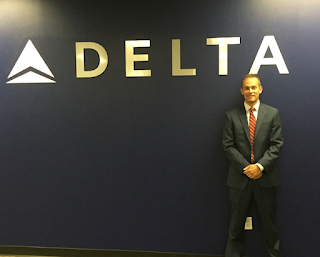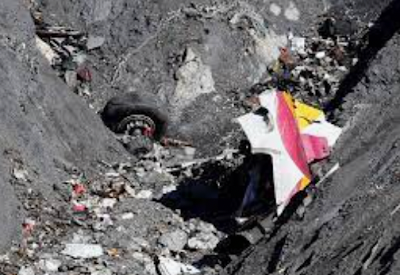Contract Airline Services
"We are the protagonists of our stories called life, and there is no limit to how high we can fly."
PHD. MBA. MHS. Type rated on A350, A330, B777, B747-400, B747-200, B757, B767, B737, B727. International Airline Pilot / Author / Speaker. Dedicated to giving the gift of wings to anyone following their dreams. Supporting Aviation Safety through training, writing, and inspiration. Fighting for Aviation Safety and Airline Employee Advocacy. Safety Culture and SMS change agent.
Monday, March 6, 2023
Delta Pilot Suicides
Friday, May 27, 2022
Mental Health and Culture
Of An Airline
Wednesday, March 22, 2023
FAA Safety Summit and Mental Health
"Judge says FAA Chief Helped Delta Air Lines Retaliate Against Pilot Who Raised Pilot who raised safety Concerns."
By Maximus Aviation
Tuesday, March 18, 2014
MH370 Did Not Fall From The Sky
Frustrated that the search was being conducted in the wrong area I finally spoke out in MH370: Time to Speculate in hope that we could send the search crew in the correct direction.
It was not until days later that the authorities ruled out that initial speculation and came on board that this was not an accident and the plane did not fall out of the sky. As the days progress I am becoming equally frustrated as to what the media is saying.
or jumping to conclusions?
I may have been the first social media pilot to speak out speculating that the plane was hijacked and did not blow up, fall apart, and/or depressurize and fall from the sky. Many comments are now coming in saying I was right. I don't care if I'm right, as long as we learn what happened. I have also received many emails asking how I knew the plane was taken and there was not a catastrophic failure.
How did I know?
 I used system knowledge and standard aviation procedures to deduce that it was not a catastrophic event and there was human intervention. But there is more. The reason could have something to do with the fact I was able to write an aviation thriller, Flight For Control, about pilot suicide and then two months after the novel was published a Jet Blue captain was locked out of the flight deck due to a mental breakdown.
I used system knowledge and standard aviation procedures to deduce that it was not a catastrophic event and there was human intervention. But there is more. The reason could have something to do with the fact I was able to write an aviation thriller, Flight For Control, about pilot suicide and then two months after the novel was published a Jet Blue captain was locked out of the flight deck due to a mental breakdown.  Three weeks ago the sequel, Flight For Safety, came out about the challenges of automation with some very frightening truths—pilots losing their flying skills and not able to land and or fly their planes. This novel was in the hands of an Airbus A330 technical editor the day Asiana 777 crashed in San Francisco, with an exact scenario I had written a year prior. How did I know? I saw it coming.
Three weeks ago the sequel, Flight For Safety, came out about the challenges of automation with some very frightening truths—pilots losing their flying skills and not able to land and or fly their planes. This novel was in the hands of an Airbus A330 technical editor the day Asiana 777 crashed in San Francisco, with an exact scenario I had written a year prior. How did I know? I saw it coming.Book Three: Flight For Survival is outlined and the prologue features a plane that disappears over the Atlantic without contact. Yes, this was written before MH370 disappeared.
How am I writing these novels that are playing out in real life?
34 years flying, 8 airlines, 7 type ratings and twenty-three years instructing for major airlines on international aircraft, I have watched the history of automation increase in direct proportion of skill deterioration. Once again I speculated on what could happen and it came true—a major airliner crashed a perfectly good airplane.
I am not a prophet, I am an airline pilot with vast experience in flight training and human factors, and I saw the automation issues coming over twenty years ago. There is a reason experienced pilots are landing at the wrong airports and having mishaps with their planes.
I've lived through mergers, pension loss, and furloughs and see what it does to people. I took it upon myself to get a Masters in Human Services to help understand the human psyche.
Do I think someone landed MH370 in a remote strip? No. Maybe this is wishful thinking on my part because if it is, our world would be in trouble, as Mark L. Berry outlines in his theory. Better safe than sorry?
My belief comes from deductive reasoning based on my automation and heavy jet experience, and what would have had to happen to make that landing a probability. I always say, never say never. But tomorrow I will share with you why I hold the beliefs that I do.
The Power of Speculation
Aviation control and regulation is reactionary. Speculation is about being proactive. Being proactive can prevent accidents from occurring and can keep terrorists off planes. Being proactive prevents people gaining access to an aircraft with stolen passports. It means not waiting five days to expand the search to passengers, crew, and a possible area outside the span of a plane falling out of the sky. There was no way what happened to AF447 could have happened to the Boeing.
If we can deduce and speculate what might happen from what we know, we can prevent it from happening in the future. We can also find this plane if we zero in on what might have happened by focusing on facts instead of jumping to conclusions which wastes valuable time. We lost at least five valuable days while heading down the wrong path.
The Time To Speculate post has had 118,000 views, and still counting, with hundreds of comments. (I am still planning on responding to everyone. Thank you for your patience if I haven't got to yours yet.)
Speculation done without blame, fear, and ignorance is nothing more than brainstorming. Our challenge is whether or not we have all the facts. Due to national security I can imagine the ‘classified’ information is being withheld. So we as viewers of this horrible movie can only speculate with what we know. Do we know everything? I'm not sure that we do.
Tomorrow, Wednesday March 19th, I will tell you why I do not believe the captain was to blame and why I do not believe the plane landed someplace to be used again in my post Debunking Myths of MH370.
We will find this plane and the answers. Until then, my heartfelt prayers go out to the families and friends of those on board MH flight 370.
Enjoy the journey and keep the faith!
XO Karlene
Tuesday, January 18, 2022
Alcohol and Pilots
Guilty Because We Say So!

- Substance abuse assessment
- 28 day (preferably in-patient) treatment program
- Establish peer and company sponsorship
- 3 month intensive out patient follow up (IOP)
- Heavy involvement in AA
- Establishment in regular aftercare
- Psychiatric and neuropsychological evaluations by HIMS-trained addiction specialists (P & P)
Wednesday, June 6, 2012
Pilot Suicide kills 44
The accident was said to have been caused by the captain disconnecting the autopilot and directing the aircraft to the ground deliberately.”
Do pilots feel there is hope, and they are in control of their lives today?
Where do you feel the future of Aviation is headed?
Where will we be in ten years?
Join me in Jacksonville Florida... Specifically: KCRG. Craig Municipal Airport. This Saturday June 9th from 10-Noon. Katja is hosting a Flight For Control Book club meeting. We're focusing on the future of Aviation, and what we can do to make the skies safer. I would love to meet you.
What can you do to make the skies safe?
Enjoy The Journey
Wednesday, October 3, 2012
Suicide By Plane
JetBlue pilot subdued by passengers during mid-air rant (3:33)
Tuesday, May 23, 2023
Weaponization of Mental Health
FedEx this time...
And Delta becomes involved
- Fix the Fuel Low light per certificate requirements.
- Ground the fleet until the proper investigation could be conducted.
- Mandate a running fuel log in the logbook.
- Make Aircraft Communications, Addressing and Reporting System (“ACARS”) entries for shutdown fuel and fuel added and independently track entries in the flight logbook.
- Require calculations for zero fuel weight approach speeds so crews can estimate the fuel state.
KILL THE MESSENGER
It would be so much easier if airlines would solve the problem, instead of killing the messenger. But when that messenger has nine lives, and the company is running out of options... my advice is don't go to court and air your dirty laundry, just apologize and do the right thing.
How Many Bullets to Get Rid of a Pilot?
Bullet 1: Section 15
December 17, 2021 prostan called Phil and reported a pilot complaint. He characterized the entire complaint a nothing more than a "political vendetta/dispute."
December 18, 2021 Phil was grounded. FedEx immediately put Phil into a Section 15, without rationale. Section 15 is a psychiatric evaluation process that I, too, experienced at Delta for my reporting safety. Funny thing is, unlike my neuropsychological testing and the three-days in Chicago over period of many months, and being dead-bolted in a room with Dr. Altman for the evaluation, Phil's psychiatric evaluation consisted of a singular recorded phone call with Dr. Fred Tilton and a representative from Harvey Watt insurance company.
December 20, 2021, Phil's evaluation began.
Phil stated that Dr. Tilton opened with 20 rapid-fire questions without taking a breath. Phil responded by stating, "Doc I can answer questions one at a time, please, pick just one."
That's when Dr. Tilton lots it, so much so that at the end of the this mental health evaluation he apologized to Phil for his behavior. He said something to the effect of "I'm sorry I had to get a little nasty." Phil took it as that was the goal to goad him. So Phil said, "You were just doing your job. Happy New Year."
January 3, 2022, Phil passed this mental health evaluation. He suspects it was only due to the embarrassment that Dr. Fred Tilton would face to have that audio go anywhere. I haven't heard it yet, but I will at the trial and therefore it will find its way to Youtube. I suspect, based upon what I've been told, that this call may indicate that the doctor was a screaming banshee and the patient was composed. Hard to make an adverse diagnosis when that happens, even if the company is paying you to do so. These retaliatory evaluations are conducted by bought-and-paid-for doctors. Medical Fraud Abuse is living practice.
They were expeditious in this process for Phil compared to my evaluation process. My process was 18 months, whereas Phil's was only 16 days.
SECTION 15 FAILED
When bullet 1 misses, bullet 2 is ready to be fired!
Bullet 2: Section 19
January 4, 2022 Phil received disciplinary action. When the Section 15 failed to do the job, FedEx placed Phil on disciplinary action the very next day. Now, the fact that they have nothing to discipline him for, but an unverified report, they needed to create something.
FIND DIRT
FedEx found three first officers to write a complaint, "after" he was placed into disciplinary action of which they stated in their letters, "per your request" indicating these were solicited reports. Then these pilots used the same wording in each of their reports. I am most certain that these boys will find themselves in management one day, and the judge will smell a rat. Regardless, this wasn't enough.
Fleet Captain Kevin Whearty was already conducting a "lookback." This is the same tactic Delta uses on their pilots. This is also the same chief pilot that Phil reported to regarding weight and balance concerns.
David DeBerry provided Whearty a background. He stated, "Let me know if this is what you're looking for on Phil Seubert, I can did a little deeper if needed."
Phil had no training failures. He had no violations. The only issues in his life were tragic. His fiance had died a year before this all began and on May 19, 2021 his son was killed. When his son passed he had to argue with the company to keep his assigned vacation in order to grieve and be with his other children.
Phil had worked for Delta back in the day, and had left in 2006. So they went deeper, and the hunt for dirt moved to Delta Air Lines.
Apparently Delta has not learned their lesson after losing my AIR21 trial and losing their subsequent appeal, because they are now helping FedEx to do the same thing to a pilot for reporting safety concerns. There are some missing pieces to the chain of emails. I suspect the request came via a phone call, or perhaps they withheld documents in discovery as Delta did in my case. Either way, this is what we know:
On January 31, 2021 the email exchange began as the result of the Delta search.
Delta Air Lines Fleet Captain Bill Thurber wrote to Delta Air Lines Managing Director of Training, Rich Kaynor:
Subject line: FedEx. Instructor Phil Seubert Mystery Solved.
"Hi Rich, Doug Howard's Phil Seubert did indeed have a chapter with our Company. His personal record is below; I have no idea why he left us. From his PQIS file I see a quick run through the 767B seat with subsequent categories in the 737B and M88B seat. I do not see a CAGS nor POI code on his record."
Rich Kaynor forwards this information to Sarah Howard and simply writes, "Interesting...."
Sarah howard forwards this information to Doug Howard, and writes.
"He was a Delta line pilot for 5 1/2 years but was never in the training dept. There's a story there for sure but who knows what it was."
Sarah is not using a FedEx email. Is she Doug's wife? Is she trying to keep this off the record? I don't. But I am happy to clear up the big mystery. While their subject line say's mystery solved, I think there is some confusion as to why he left.
Leaving Delta Mystery
Rich, Bill, Doug, and Sarah, the "story" and reason Phil left Delta was that he had only 5 years invested, more than enough time to see the culture and the writing on the wall with company mismanagement. At the time Delta was headed in the toilet. Delta had even filed bankruptcy in 2005. He viewed FedEx to be a better career life match for longevity. Any pilot would think that was a no-brainer career shift.
FIND DIRT FOR DISCIPLINARY ACTION FAILED
When bullets 1 and 2 miss the target, they fire bullet 3.
Bullet 3: HIMS
ALPA tells Phil he will be terminated immediately if he doesn't enter HIMS (The Alcohol Substance Abuse program). Bill Tenner, from the FedEx HIMS program reached out to Phil via text messages. He and Phil met for breakfast, at which time Bill attempted to sell Phil on the HIMS program.
Phil said, "The problem is, I don't drink."
Bill responds, "That doesn't matter. Exercising too much can be an addiction too."
One of the many issues with the HIMS program is that the reason a pilot drinks is not addressed. Just removes the crutch if that is the reason. If you replace one crutch with another, such as food for alcohol, you're simply eating your feelings no longer drinking them. A heart attack ready to happen. The very reason we need two pilots at all times. But often pilots commit suicide in this program. The chair of Delta's HIMS program did just that.
The second reason I have issue with the HIMS program is that airlines use this program as a tool of retaliation, not unlike Section 15, to rid itself of pilots. They place you in the program and administer a non-FDA approved Dry Blood Spot (DBS) PEth test that is known to produce false positives... career over. This is what happened to Delta Captain Ratfield as a form of retaliation. The reason to put her in HIMS because she was "raped" is almost more ridiculous than putting a pilot in the program who doesn't drink.
Furthermore, does anyone think that telling a pilot who doesn't drink that the HIMS program is his get out of jail free card because he exercises too much?
CONVINCING PHIL TO JOIN HIMS: FAILED
When bullets 1, 2 and 3 miss, fire number 4!
Bullet 4: PATH
They failed the Section 15, couldn't get dirt from Delta, he refused to into the HIMS program, what could possibly be next? "PATH"
May 2022, Kandy Bernskoetter reached out to Phil to get him into the PATH program:
Phil has only been seeking fixes to the maintenance problems that could have been catastrophic on multiple accounts. I know Kandy. She assisted connecting me to some pilots during my research, after I was cleared. However, during my event, unbeknownst to me, she had reached out to her counterpart at Delta, Mark Pinsky, to ask about my being diagnosed bipolar. FedEx appears to have an open door with Delta when they are snooping into a pilot's life.
She told me that she did not believe that could happen later in life and asked Mark Pinsky. Mark said, "Yes, it can. Ask my sister, she's a psychiatrist." Then Mark put Kandy on the phone with his sister the psychiatrist who told Kandy why I could be bipolar later in life.
I'm uncertain if Kandy knew at the time that ALPA legal had been trying to convince me to go to Mark Pinsky's sister as the final and binding doctor. I had refused because of a conflict of interest, a violation of the contract and those little hairs were standing up. Kandy did not share this information with me until after I was cleared and returned to work. Therefore I dodged a bullet on my own. I later asked her to testify. She refused. I told her I planned to subpoena her, and she became livid.
Now Kandy is encouraging Phil to go down the mental path in another manner, on his own, despite a clearance during his mental health evaluation, followed by his refusal into HIMS due to his lack of alcohol consumption.
CONVINCING PHIL TO JOIN PATH: FAILED
When bullets 1, 2, 3, and 4 end up in a brick wall, fire bullet 5!
Bullet 5: Threaten IRS Action
ALPA is now agitated and threatening. Why do they care? Good question. Phil has gone non-qual; therefore, he doesn't need sick leave, he can't fly because of the company having pulled him. They have to pay him. However, ALPA is pissed he's not using up his sick leave. They threaten him with the IRS because they assert he is not filing his taxes properly. I faced the same issue (less the IRS threat). Delta made me use not only my sick leave, but vacation too. I should have been as smart as Phil, because I was non-qualed and did not have to use my sick leave or vacation. The judge, however, made Delta reimburse me for vacation and the sick leave was a use it or lose it option.
For Phil, and me, ALPA would not make any effort to find any discovery for the pending grievance hearings. How far will this go?
THREATENING THE IRS: FAILED
When bullets 1, 2, 3, 4 and 5 miss, let's go for number 6, the final round in the chamber.
Bullet 6: The Hearing
Throughout all this time, Phil had never seen a written complaint. He asked ALPA over and over again. He then goes out on disability due to sleep issues. Clearly exacerbated by the stress of this ongoing attack. Not only from the company, but the knowledge that ALPA is helping FedEx, not him.
The letter of complaint finally arrives. But not to Phil, to Captain Sid Graham, 767 Chief Pilot. He received a copy of the complaint on August 4, from Captain Whearty, who received his copy from Veronica Swink. Whearty says, "Thanks Roni" and passes it on.






































